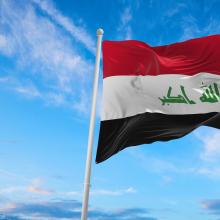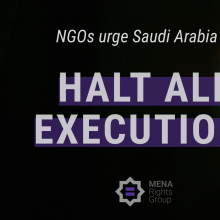January 08, 2019
Originally published on Middle East Eye on December 6, 2018.
In an article published on 31 October in the Jordan Times entitled "Social or anti-social media", King Abdullah II vowed to “combat rumours and misinformation, and counter hate speech”, noting that “anyone who offends a Jordanian - whether from my bigger Jordanian family or my immediate family - offends me personally.”
To an informed reader, the timing of the article may raise suspicions. One could interpret it as implicit support of new amendments to the country’s cybercrime law, recently brought before the parliamentary legal committee for discussion. The text could be brought before parliament for a vote at any moment.
If the text is adopted, it will be the second time that the 2010 law has been amended. In 2015, a provision was introduced to punish defamation on social media and online media outlets with a minimum of three months in prison, which has been used as a basis to arrest and detain a number of critics.
Widespread criticism
Around the same time, a special tribunal for interpreting laws confirmed that the cybercrime legislation superseded any other text, sparking widespread criticism among media workers and marking a huge setback for journalists, who would no longer enjoy protection against imprisonment under the press and publications law.
In 2017, after government officials declared that they wanted to address hate speech on social media, draft amendments were presented. The revised text includes a broad definition of hate speech, which can constitute "any statement or act that would incite discord; religious, sectarian, ethnic or regional strife; or discrimination between individuals or groups".
The amendment also introduces a prison sentence ranging from one to three years and a fine of up to 10,000 dinars ($14,000) for anyone who has published or republished hate speech.
The move was quickly criticised by civil society organisations, including the Center for Defending Freedom of Journalists. Jordanians also launched a social media campaign using the hashtag اسحب_قانون_الجرائم_الإلكترونية# (#withdraw_cybercrime_law). In a television interview on 20 November, Prime Minister Omar Razzaz said that the definition of hate speech was “flawed” and “should not open the door to abuses”, but ultimately affirmed that it was parliament’s decision.
Earlier this month, during the UN Human Rights Council third universal periodic review of Jordan, concerns were raised over the cybercrime amendments. It remains to be seen whether Jordanian authorities will address them.
Defining hate speech
When addressing “fake news” and hate speech, one must look at the definition of the right to freedom of opinion and expression under international human rights law. Article 19 of the International Covenant on Civil and Political Rights (ICCPR), to which Jordan has been a party for more than four decades, sets out the conditions of restrictions to the right to freedom of expression.
These restrictions must be “provided by law” and necessary for the “respect of the rights or reputations of others” or “the protection of national security or of public order … or of public health or morals”.
The issue, therefore, lies in what constitutes “hate speech”. Although there is no agreed definition, the ICCPR, while protecting the “freedom to seek, receive and impart information and ideas of all kinds”, prohibits under Article 20 any “propaganda” or “advocacy of national, racial or religious hatred that constitutes incitement to discrimination, hostility or violence”.
The UN special rapporteur on the right to freedom of expression, David Kaye, has pointed out that governments must strike a balance between regulating hate speech and promoting free speech, explaining that the question is “to define when does hatred cross the line from being merely [an] expression to being something that’s inciting hostility or violence against individuals”. Such an assessment requires context, he noted.
The Jordanian definition of hate speech, which vaguely refers to inciting “discord” and “strife”, thus falls short of international standards. Jordanian legislation already includes vaguely worded provisions, such as Article 150 of the Penal Code, which stipulates that “any writing or speech or act that aims at or results in causing sectarian or racial strife, or instigates conflict between members of the sects and different members of the nation” is punishable with a prison sentence ranging from six months to three years.
Harassing peaceful critics
This provision has been used in the past to judicially harass peaceful critics, who can be prosecuted before the State Security Court (SSC), which lacks independence and impartiality. The court, composed of judges appointed by the prime minister, has jurisdiction over a wide range of acts, some of which directly relate to the exercise of freedom of opinion and expression.
Scores of people have been brought before the SSC on other charges based on vague and broad provisions of Jordanian legislation, including the anti-terrorism law and the Penal Code, which criminalise acts such as disturbing the "public order" or encouraging "the contestation of the political system".
Alarmingly, such trumped-up charges have, in some cases, been coupled with accusations of "insulting the king", a criminal offence set out in Article 195 of the Penal Code and punishable by one to three years in prison.
The UN Human Rights Committee has repeatedly called on Jordan to amend these flawed pieces of legislation. Most recently, in 2017, the committee called on Jordan to “review its legislation with a view to ensuring that criminal sanctions are not applied to persons expressing critical views and that any restriction on the press and media activities is in compliance with the Covenant.”
Silencing dissent
Jordan is not alone in the Middle East and North Africa region in its attempt to further limit freedom of opinion and expression under the pretext of combating fake news and hate speech. During the months of August and September, Egypt ratified new legislation on cybercrime and media regulation, the latter granting the Supreme Media Regulatory Council the power to block social media accounts publishing “false news”.
Behind this lies a clear intent to create an even stronger climate of censorship and to silence any form of peaceful criticism.
Jordan, just like Egypt and other countries, must be reminded that although fake news and hate speech - particularly in the context of the rise of extremism - must be addressed, it must not be at the expense of fundamental rights and freedoms. Jordanian parliamentarians should heed the advice of the international community and bring the cybercrime law in line with global human rights standards.






